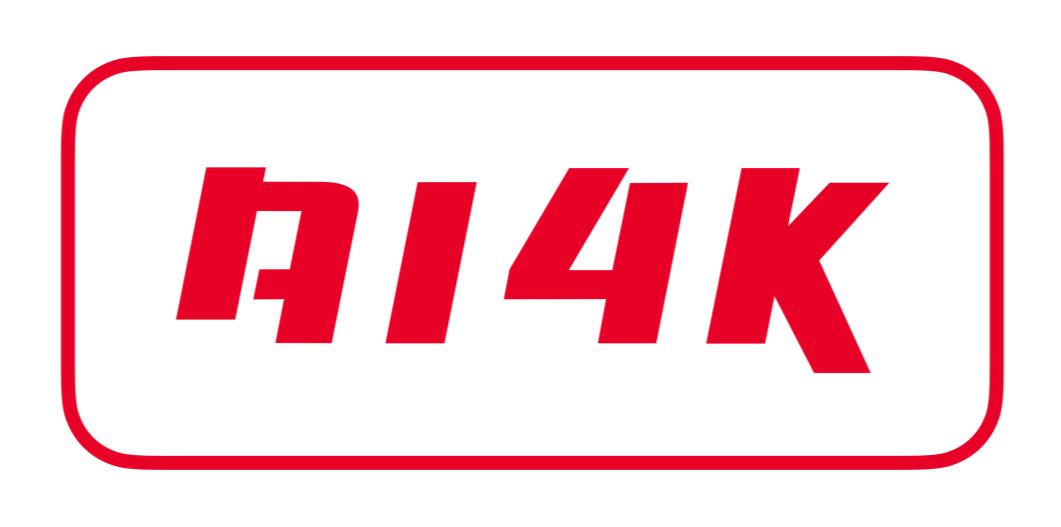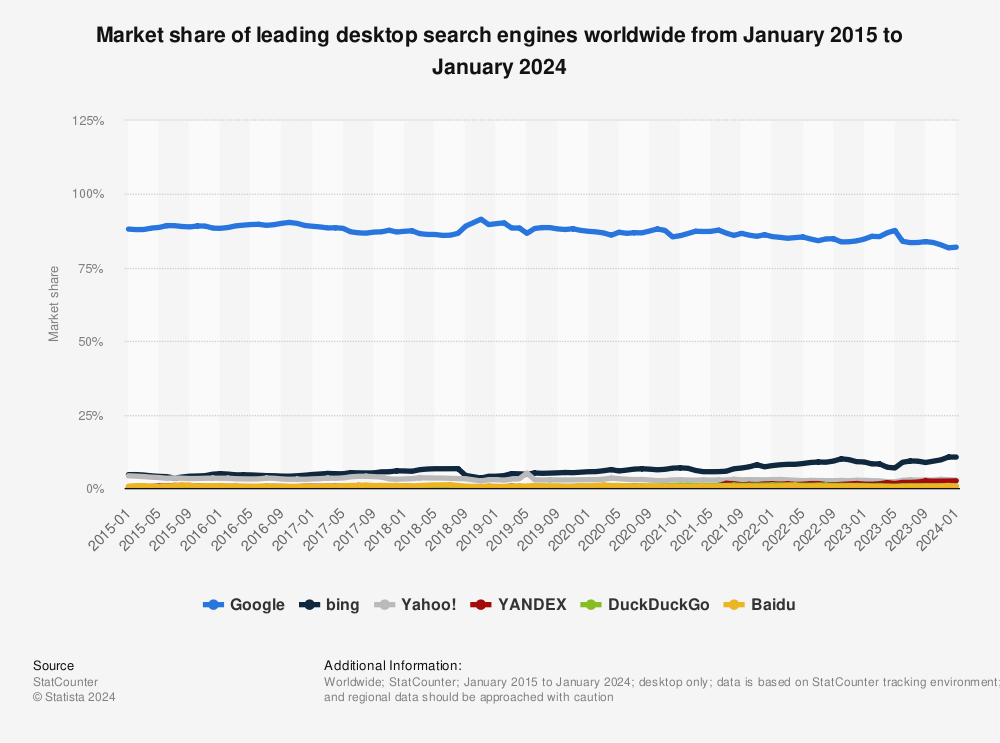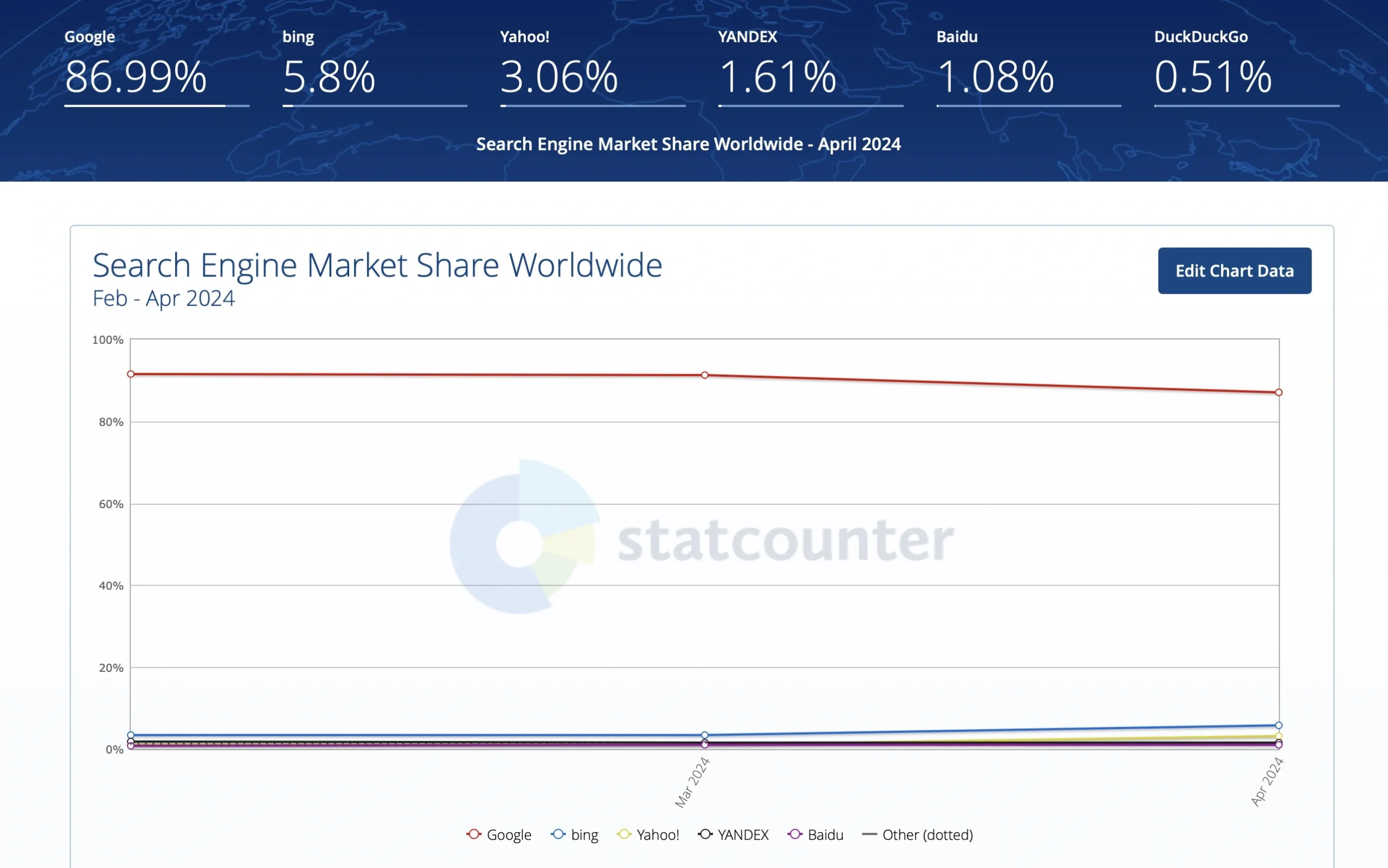Introduction
The search engine market in 2024 continues to be dominated by Google, which maintains a market share around 90% globally across all platforms4.
However, there have been some notable changes and trends.
Despite its rapid growth, Perplexity AI faces significant challenges in the search market, although the startup’s innovative approach to search and strong backing from investors position it as a potential disruptor in the space12.
It turns out that Statcounter and other web traffic counters show in April 2024 a significant decrease in traffic on Google’s search engine and, at the same time, an increase in web traffic on Bing and Yahoo. There are also strong rumors that OpenAI will be launching in May 2024 a new search engine, obviously with AI.
Search Engines Status
Google’s Dominance
- Google accounts for 96% of global mobile search traffic, 91.94% of tablet search traffic, 86.35% of desktop search traffic, and 64.21% of console search traffic4.
- In the US, Google’s market share is slightly lower at 88.95% compared to its worldwide share of 92.96%4.
- Google is not the most used search engine in only 2 countries – China and Russia4.
Microsoft Bing’s Gains
- Between February 2023 and February 2024, Bing’s US market share increased from 6.35% to 7.87%, while its worldwide share increased from 2.81% to 3.31%3.
- Over the same period, Google experienced a decline in US search market share from 88.96% to 87.46% and worldwide from 93.37% to 91.62%3.
- Bing’s gains, though small, are significant as Microsoft has stated that even a 1% increase in market share could mean $2 billion in new search revenue3.
Other Search Engines
- Yahoo is the third most popular search engine worldwide on mobile devices with a 0.6% market share4.
- DuckDuckGo, a privacy-focused search engine, grew its market share from 0.15% to 0.53% between Q1 2017 and Q2 20234.
- Local search engines like Naver in South Korea also have a significant presence in their respective countries4.
- Search Engines with AI are taking the market by storm, most of them using OpenAI GPT LLM models or similar to output fast, reliable and providing references.
- AI content generators like ChatGPT, Claude, and Gemini are being used massively to provide answers to millions of user queries daily.
- Custom GPTs, LLM platforms (like Grok) and AI Chatbots (Poe, for example) are being used to obtain niche information that was previously searched on Google.
- TikTok and Facebook are used today too as a search engine.
Search Engine Market Share in 2024
While Google remains the dominant player, Microsoft Bing has made modest gains, and alternative search engines are slowly increasing their market share, particularly in specific countries and on mobile devices.
- Google remains the dominant search engine, though its market share has declined slightly from past years as alternatives have emerged. It continues to improve its AI capabilities and personalization features.
- Microsoft Bing has grown its market share somewhat but is still a distant second to Google. It has focused on improving features for businesses like advertising and analytics tools.
- Amazon has also grown its market share from search tied to Amazon products and pages. It continues investing in machine learning for search and personalization.
- DuckDuckGo has become a popular alternative for those seeking privacy-focused search options. It has grown significantly due to increasing privacy concerns among users.
- New specialized search engines focused on areas like images, videos, academic research or specific products or services have emerged to gain market share in niche areas that the major players do not well address.
- Voice assistants like Alexa and Google Assistant handle an increasing share of search volume as people find them a more natural way to search than typing queries.
- Privacy-oriented browsers like Brave have launched their own private search engines integrated within the browsers.
- More private, decentralized search options relying on blockchain and web3 technologies have been introduced but still have very small market shares in 2024.
- All major search engines like Google, Bing, Amazon and others have incorporated AI throughout their systems to vastly improve relevance and retrieval of search results. AI powers ranking, query understanding, result summarization and related features.
- Some niche search engines have been developed specifically using AI techniques from the ground up. These include engines focused on images, academic papers, code snippets etc. that rely heavily on machine learning.
- Private search options like DuckDuckGo and Cliqz still primarily rely on retrieval from centralized indexes but use AI for some ancillary tasks like results summarization.
- AI is helping personalized searching more through techniques like schema understanding, query context analysis from profile and history, result clustering and summarization.
- Conversational interfaces powered by AI models like ChatGPT, Anthropic’s Claude are also emerging as an alternative way of searching, augmenting traditional keyword-based approaches.
- More AI search engines capable of full-text understanding and reasoning over documents are in development. These promise deeper search abilities beyond keyword matching.






